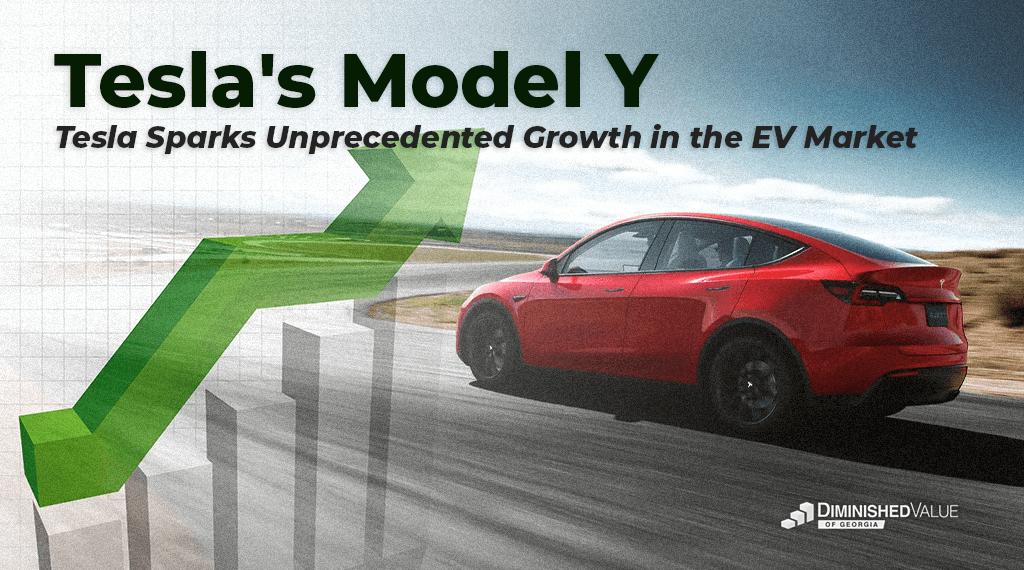Tesla’s Model Y Sparks Unprecedented Growth in the EV Market (PDF)

In the rapidly evolving world of electric vehicles (EVs), Tesla continues to blaze a trail with its red-hot growth and strategic pricing tactics. Recent data from Experian reveals that Tesla’s exceptional expansion is predominantly driven by the success of its Model Y crossover, thanks to well-timed price cuts and incentives. As other automakers struggle to find their footing, Tesla’s Model Y is shining as a market juggernaut. Join us as we delve into the details of Tesla’s unique approach and explore the implications for the EV market as a whole.
Tesla’s Dominance in the EV Market
Experian’s five-month U.S. new-vehicle registration data showcase Tesla’s impressive market presence. The Texas-based automaker experienced a staggering 51 percent increase in registrations from January to May, totaling 270,698 vehicles. These numbers accounted for a remarkable 60.5 percent share of the expanding EV market. However, this figure represents a slight decline from the previous year’s 67.4 percent, indicating increased competition from other players.
Model Y: A Game-Changer for Tesla
The crown jewel of Tesla’s recent success is undeniably the Model Y. With its starting price of $49,380 (including shipping), the Model Y’s registrations more than doubled during the January to May period compared to the previous year. Notably, this surge occurred after the company implemented substantial price reductions. Prior to the price cuts, the Model Y started at $67,440 (including shipping). Such significant growth solidified the Model Y’s position as the fourth-bestselling vehicle in the U.S. during the first half of the year, trailing only three full-size pickups.
Impressive Performance Across the Tesla Lineup
In addition to the outstanding performance of the Model Y, Tesla’s lineup boasts other remarkable accomplishments. The Model 3, serving as the more affordable sibling to the Model Y, witnessed an impressive 18 percent surge in registrations, totaling 87,200 during the first five months of the year. With both the Model Y and Model 3 sharing a platform and providing the opportunity for buyers to avail of a federal tax incentive of $7,500, they continue to attract substantial interest. On the other hand, the midsize Model X crossover experienced a modest 7 percent growth in registrations, while the Model S sedan encountered a significant 59 percent decline when compared to the previous year’s figures.
Tesla’s Closest Competitors and Their Challenges
Experian’s data highlights Chevrolet as Tesla’s closest EV competitor, holding 6.5 percent of the EV market. However, Chevrolet’s position is heavily influenced by registrations for the soon-to-be-discontinued Bolt EV and Bolt EUV, which garnered 29,282 registrations but faced significant discontinuation challenges. Ford secured the third position with 22,425 registrations for its Mustang Mach-E, F-150 Lightning, and E-Transit van. These numbers emphasize the fierce competition within the EV market and the unique hurdles faced by each automaker.
Top 10 EV Registrations in the US
| Rank | Automaker | Model | Registrations (Jan – May | 2023) | Registrations (Jan – May | 2022) |
| 1 | Tesla | Model Y | 167,900 | 82,846 |
| 2 | Tesla | Model 3 | 87,200 | 74,050 |
| 3 | Chevrolet | Bolt EUV | 18,777 | 2,227 |
| 4 | Volkswagen | ID4 | 14,094 | 3,960 |
| 5 | Ford | Mustang Mach-E | 10,948 | 15,442 |
| 6 | Chevrolet | Bolt EV | 10,505 | 1,415 |
| 7 | Hyundai | Ioniq 5 | 10,406 | 10,773 |
| 8 | Tesla | Model X | 10,263 | 9,592 |
| 9 | BMW | i4 | 9,170 | 529 |
| 10 | Ford | F-150 Lightning | 8,800 | 361 |
Tesla’s Winning Strategy
Tesla’s success can be attributed to a combination of factors. Besides implementing price cuts, the company has introduced attractive incentives such as free charging at its Supercharger network and trial versions of its advanced driver-assistance software. Additionally, the eligibility of Model Y and Model 3 for federal EV tax incentives under the Inflation Reduction Act played a crucial role in bolstering their popularity. Tesla’s ability to leverage its expanding production facilities in California and Texas, coupled with CEO Elon Musk’s willingness to prioritize growth over immediate profits, has cemented the company’s position as a market leader.
The Changing Landscape of EV Competitors
While Tesla’s dominance remains unchallenged for now, the landscape of EV competitors is evolving rapidly. Volkswagen’s ID4 compact crossover experienced remarkable growth, tripling its registrations to 14,094 vehicles during the January to May period. Ford’s Mustang Mach-E, another prominent contender in the compact crossover segment, encountered a slight decline of 29 percent to 10,948 registrations. These fluctuations highlight the dynamic nature of the EV market and the intensified competition faced by all manufacturers.
Looking Ahead: Tesla’s Unyielding Leadership
Despite growing competition, Tesla’s trajectory suggests that it will maintain its status as an EV industry leader for years to come. J.D. Power’s vice president of data and analytics, Tyson Jominy, expresses confidence in Tesla’s ability to retain its market share. The company’s commitment to innovation, ongoing production enhancements, and a customer-centric approach solidify its position at the forefront of the EV revolution.
Tesla’s groundbreaking growth, fueled primarily by the Model Y’s price cuts, exemplifies the brand’s unwavering commitment to revolutionizing the EV market. As Tesla continues to outperform its competitors and redefine industry standards, the implications ripple throughout the automotive landscape. With its relentless pursuit of innovation and market dominance, Tesla is poised to shape the future of electric mobility, inspiring both enthusiasts and industry leaders alike.



